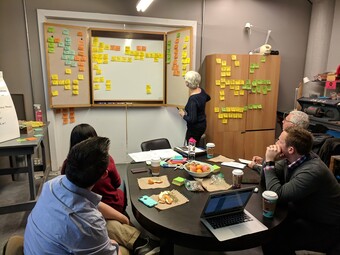Opt In
My parents were just at my home in Chicago for a weekend as our family came together to celebrate their 50th wedding anniversary. It was a lovely weekend but per usual I managed at least one inappropriate social contribution. As we were sitting around the breakfast table one morning my dad said something about there being no great singers since Mario Lanza and my mom started a sentence with “Movies today….” I erupted with something along the lines of “Don’t you think it’s time you two joined the twenty-first century?” Of course, often my rampages directed at my family are related to other frustrations and in this case that comment was a direct result of something gnawing at me about working in the theater, especially that branch we call “big institutional theater.” So sorry, Mom and Dad, that I took it out on you.
When I was running the Playwrights’ Center in Minneapolis, one of the many mistakes I made as a leader was choosing not to opt in to learning anything I didn’t think I had to learn. My reasoning was what I’ve heard from many artists in leadership positions—I have enough on my plate. For me this failure to opt in was usually related to technology, it was something I thought I could live without understanding. I accepted that I needed to be functional, even capable, but don’t bother to show me the “how” of it; my mind would shut down. And so the second apology in two paragraphs goes out to Kevin McLaughlin who supported this bad habit for many years at the Playwrights’ Center.
But what I learned about my bad behavior, after I decided to correct it, was that by choosing not to opt in I had done at least three unforgivable things:
- I ceded power over the messaging of the organization to others in the organization, and by doing so, lost a handle on the relationship between my personal vision and its public articulation.
- I perpetuated a profound misunderstanding of what it took to make the “how” of technology happen. For example, I would say “Let’s start a blog” and then sit back and wait, expecting a blog to appear in the next hour. Things we don’t know how to do, that we are in power to authorize others to do, don’t seem like a big deal. I was always frustrated by how slow things were moving and thought I could do it faster—except I didn’t know how to do it!
- I perpetuated the notion that leaders know less than their minions “on the ground.”

Social Media and the Culture Wars Revisited
My observation of how opting out manifests in a lot of theaters results in what I would call the new culture wars. The young and savvy know how to send out the message of the organization. An army of interns is behind the Twitter feed and the Facebook status updates. They are choosing what articles and video your theater links to, they determine the question of the day to pose to your audience, while those higher up the food chain do the “important stuff”—make theater.
These aren’t just generational culture wars though they sometimes look that way. They are also culture wars rooted in creative hierarchies, where the real conversations about art and finance supposedly happen behind closed doors, and the aspiring and energetic think about cool blog posts and innovative audience engagement strategies, but feel perpetually left out of the interesting work.
Institutional culture is stagnating inside of large institutions. There, I said it. Mom and Dad, you’ve got to join the twenty-first century!
Because in twenty-first century culture guess what?
We all have access to the means of production. We can all make art. We can all write blog posts. We can try our hand at just about anything.
What would true cultural transformation look like? How might we create relevant institutions—hip, savvy, and culturally forward-thinking?
And the aspiring, energetic, technically savvy, and wildly creative minds swelling our big regional theaters have something important to tell us about institutional culture, and if we’re not careful, if we don’t listen and pay attention, they’re going to take their big ideas elsewhere.
And I have to respectfully disagree with the recent New York Times post “The Elusive Big Idea” that argues we’re in a “post-idea” age where information has supplanted thoughtfulness. I’ve never been inundated with more good ideas and never have they been so accessible, but will we take the risk to implement these ideas?
As artists and participants in artistic institutions, we’ve smugly thought ourselves to be always on the righteous side of the culture wars—but have we become the very thing we fought against? Have we become the risk-averse people we so despised when Mapplethorpe was the biggest threat to our way of life? Is institutional transformation now the very biggest risk?
Times They are a Changin’
Rocco Landesman, in his now famous talk at the Arena Stage Convening in January, talked about the formation of the regional theater model, rooted in a countercultural moment of the 1960s. Our founders were about creating something new, not perpetuating the status quo. Our roots are in cultural transformation.
What would true cultural transformation look like? How might we create relevant institutions—hip, savvy, and culturally forward-thinking?
I’ve made myself nauseous talking about risk and new work. I’m not sure I even believe it anymore—I mean, really? Putting on a new play is risky? When I think of risk, I think of raising children, or changing jobs, or moving across the country. Risks are things that make us profoundly uncomfortable because they’re unfamiliar. If, as a theater artist, you even bothered to get out of bed in the twenty-first century, well, I find it hard to believe that new work is your version of risk. If that’s the case, you might as well just lie back and pull the covers over your sleepy head.
But here are some risky ideas institutional theater might consider if they decide to opt in to the twenty-first century:
No One Likes to Clock In
We manage time differently today. Work and personal time bleed into each other as we all have access to our work email on our smart phones. We no longer need to go into the office from 9 a.m. to 5 p.m. to be effective at our jobs. And we work in the theater, for god’s sake! Many of us have late nights in the theater and are then expected to be around for regular work hours.
There was a time when regular work hours were a necessity for everyone, but that time has passed! Consider throwing out this model and building a work culture on the understanding that everyone’s rhythm is a little different; that work place flexibility could lead to a more productive culture. That creative people value creative time. That most people don’t maximize creativity in a cube. That generations who have always worked plugged in know more about the need for flexibility than those who have spent a lifetime clocking in.
Hierarchies Suck Creativity Dry
I’ve never found hierarchies to be representative of the actual value of individual workers. In other words, some of the best employees might be in administrative assistant jobs, while some of the most ineffectual are in director positions. But generally, the directors stay and the best admin assistants look for more respect elsewhere. And so institutions perpetuate themselves at the top while workers are interchangeable at the bottom.
What might a disabled hierarchy look like?
What if artistic directors spent an hour or two everyday on Twitter and Facebook, interfacing with audiences while interns practiced persuading the marketing department of a more effective ad campaign for the season? What if a managing director made travel plans for a visiting artist while the company manager attended the next TCG Conference? Guess what?
Everyone likes to feel important in their work and this doesn’t just mean thanking those lower on the totem pole for their service. It means recognizing that in the small theater companies many of us came from, we’re all in this together and that most of us didn’t choose the corporate model on purpose!
In this new century, transparency makes hierarchies, well, more transparent. Technology makes expertise more widely achievable. If I reject your submission to HowlRound, then you can publish it yourself. If your ideas gain currency, so will your expertise, and the hierarchy of publishing, for example, rests on a precarious precipice—the kingmakers are on tenuous ground.
One can either cling to the precipice or redefine the conversation and the hierarchy.
If I reject our submission to HowlRound, then you can publish it yourself. If your ideas gain currency, so will your expertise
Pay Disparity Just Kind of Sucks
No one likes to think their contribution to a value hopefully shared by a community—the theater—is so much less important than someone else’s that their pay is ten or twenty times less than a co-worker. But we are very comfortable with this in big institutional theaters.
Alienated Labor Shouldn’t be a Value of Leadership
If it’s true that the regional theater model was founded in a mindset of countercultural fervor, then my guess is that a lot of the founders read a little bit of Marx along the way. Those of us who have, know that alienated labor, “where each individual functions not as a social being, but as an instrument,” can have its problems.
Most of us choose to make art as a living because we are unwilling to be cogs in the wheel of production. We believe we have a creative contribution that relies on the possibility of self-determination and experiencing firsthand the eventual fruits of our labor.
Having been around a lot of big theaters over the years, around a lot of employees of big theaters, around my partner’s former life in the corporate cube, I can only say I’ve never met a happy cog in a wheel. Never.
This is why leaders have to know how to do things they would rather not take the time to learn. Because when they enter the turning of the wheel as a mechanical part versus the instigator forcing rotation, they learn invaluable lessons about the difficulty of life as a cog.
Regularly inhabiting the lives of those we lead will change how we lead.
A New World Order
The twenty-first century is here in full force. Let’s not wait for the revolt of those further down the chain of power. Many world leaders would warn us to take heed now.
In the same way that we have embraced the conversation about the importance of new work this past decade, let's embrace new ways of working. Let’s risk new models of organizational culture that parallel our creative impulses inside the rehearsal room. This will reverberate in ways that I believe will not only build new cultures but make new stories possible for the theater.
Almost everyday I talk to aspiring theater artists, seeking desperately to inhabit the rooms of privilege I’ve been lucky to enter over the years. I’m personally convinced those rooms have more space, but if there are limitations to acknowledge, then let’s find a way that the rooms surrounding those rehearsals rooms are just as compelling to live in.
So I say opt in. Opt in to a twenty-first century way of working and creating that requires a serious shift in relearning the “how” of organizational culture, diving into the backend structure where the code is being written that will define the day-to-day functionality and the public messaging that will ultimately define your theater.










Comments
The article is just the start of the conversation—we want to know what you think about this subject, too! HowlRound is a space for knowledge-sharing, and we welcome spirited, thoughtful, and on-topic dialogue. Find our full comments policy here
Valorie,
First off thanks for jumping in to the conversation, I certainly don't write these pieces to repress conversation/comments so yours are appreciated.
I completely agree these aren't new ideas, and as I said in the piece I actually think they are the ideas that shaped the regional theater movement, hence my concern that values at the foundation of many theaters have been completely left behind. I agree that the language of "vision" and "leadership" feels old, but it's language that is by no means dead but agree with you that these words either need to be tossed or made to feel meaningful again.
Your point about vision is one I've made in other pieces I've written and we're on the exact same page here. The idea that one person's vision could possibly represent an entire region or maintain its relevance consistently over twenty or thirty or more years is the great arrogance of the current hierarchies of the regional theater and a big reason so few artists can actually be served by it. My worry is that the big theaters with millions at their access serve so few artists and such a limited audience.
I'm not sure the point you're making about technology, but I don't agree that the impact of technology is the same as it has ever been. What I think new technologies are allowing us is a way to see the limitations of the old ways of doing business more clearly, making hierarchies less sustainable than ever before.
Previously if I didn't like the journalism coverage of the American theater I would be hard pressed to make significant change because I would need a lot of money for printing, mailing, advertising---but now in a short time span and with very limited resources I have the ability to create and disseminate a new forum for conversation. Thanks so much again for participating in that conversation!
Gee, everyone is so nice (and still fairly idealistic). I'm almost afraid to say anything, but then, if I don't, what will drive this dialogue beyond the same old, same old into something new and maybe even useful? So, here goes. ...Polly, sorry, but none of your insights are new. Problems with hierarchical organizations and power (because it is power we're really talking about) have been discussed by various marginalized interest groups since the 60's. Maybe it's not your parents who need to jump into the 21st century. As long as you're still using words like "leader" and phrases like "your vision", you're still stuck in that mindset. ...And hello, I think we've already lost a lot - a helluva lot, of creative talent to other mediums. There's more creativity in the average commercial than the average play in an established theatre. ...New work being risky? Is that supposed to be a new insight? Come on. That perception hasn't changed in 20, 30 years. Ask any struggling or dropped-out playwright (cue bitter laughter). No, the common wisdom from artistic directors has long been, let's put on tired old work (NOT too challenging) from 10, 20, 30, 40, years ago and still declare that we believe in challenging, innovative, healing, exciting, etc, etc, blah blah theatre. The old Pirandello-ian trick of making it so by simply saying it is so. Or, here's really the height of theatrical elitism - brush off writers of new plays with "your play doesn't fit my artistic vision". Uh, ok. Maybe the real hard question is, what's with this conceit that all the plays produced by any one theatre in a particular season should fit the "vision" (i. e. tunnel vision) of a single individual? You want to talk hierarchy? This is the theatre's version of wielding power. Art of any kind is 10% vision and 90% hard ass focused work. Maybe artistic directors need to think less about their own personal vision (and wow, that has got to be a monumental responsibility - channeling the vision for a whole community) and more about supporting muliple visions of a wide variety of different writers and artists. ...And, also, the information age? That has been with us since the 19th century, when pamphlets, magazines and books were first mass produced. Information has gone electronic, and the medium may be somewhat of a challenge, but the massive amount of data is probably, relatively speaking, no more daunting to the average person or writer today than 175 years ago. ...Aside from all these rants, the real underlying question is, what the hell is theatre? What the hell is it? What is the point? Why do we keep doing it? Why is it still relevant? (I know, I'm really asking these questions of myself.) Is it second string? Those who can't make it to LA, turn to theatre? It's got to be more than that, more than some substitute on one hand, or some unrealizable vague ideal on the other. ...And the answer to what is theatre, the answer that is relevant for us today, will give us a hint of the direction we should take. Maybe. ...Ok, now that I've got that off my chest, I expect I'll get blasted. But if any ensuing discussion pushes beyond the superficial, it'll all be good.
Yes! And what may be discovered when opting in is that the "new" Theatre looks very much like older models of Theatre. Like when it was not in the hands of big institutions, but belonged to the creator/performers who traveled the countryside actually entertaining people in an accessible way. The structure was not corporate and the art was rooted in physicality and was elevated out of the pedestrian realm into something really magical. The institutions are realizing their model is stale, and now everyone's scrambling to figure out what to do, meanwhile there are oodles of Theatre maker's "off the grid" who are serving hungry audiences in little pockets on smaller stages, in unconventional spaces, and they have always, and will always exist, outside of the conventions.
Thanks for writing this, Polly.
Hell yes. Every context imposes its own conditions/limitations on the work that can be developed in that context. By breaking apart the calcified context of the regional theater institution we can open up fresh and unthought-of possibilities for innovative and exciting work.
Opting in. Full steam ahead. I pride myself on being a plumber first and an artistic director second. Everyone needs plumber, right?
Thank you Polly for this great call to the future!
You’re right – it’s not new work itself that is risky. What I’m finding more and more is that rigorous in self-reflection and honest talk about where we might need to listen and learn – rather than talk and point – is the big risk. And not just in the Halls of Power, but down in the trenches as well. We all need to be willing to stand in that place of discomfort. and for the record, I'm opting in for that.
Every statement rings true. I have so many arts clients who have marginalized and trivialized all advice pertaining to social media, engaging EVERYONE in the organization, and yes, as you say "getting out of bed in the 21st century."
Polly, I have to tell you that this article makes me feel a little better about the personal risk I've taken to pursue life as an artist.
Six weeks ago, I moved to Atlanta, GA - after never having visited - to work as an unpaid intern at Actor's Express Theatre. I left all my family and friends a thousand miles away. The good thing: I'm not a cog. Of course, it's not Austin, TX, where the Rude Mechs and others not only embody every meaning of the word Collaboration, they also take over the educational institutions and teach classes about it. That said, I seem to have landed on a good middle ground. A theatre established enough to run like an institution, but small enough to value everyone whose job it is to make the institution run. Yes, I work for free. Yes, I sweep the stage before the show AND wash laundry after the same performance AND head in to my paying day-job at 8 the next morning. But, I get to be in the sacred rehearsal room; I even get to contribute sometimes. Here, the artistic director answers phones and cleans the bathroom. While this is probably out of budgetary necessity, it makes for a much more enjoyable environment in which to "pay dues." Everyone is willing to get their hands dirty.
It was a risk. Unfamiliar and uncomfortable. But, maybe everyone should try being uncomfortable at some point. Maybe theatre and the institutions that make theatre, like you suggest, should try being uncomfortable. Otherwise, how can we, in sincerity, stand in front of an audience and ask it to challenge its perceptions and ideals - to go to an uncomfortable place?
P.S. I've been reading this blog a lot since moving. It's been inspiring and encouraging to read.
Amen! This is the future that I see and feel. We risk cutting off our own legs if we cannot adapt.
Its a real good one, this piece.
Love this! The notion of collaboration over hierarchy is a great model - we may see it implemented regardless of what corporate resistance. The innovative and creative types can learn basic business practices and combine it with their passion to, hopefully, re-invigorate the theatre scene in the U.S.
Thanks for writing this! I'm glad to have read it!
Well said Polly, thank you.
I must say I concur with the previous miller.
Great piece, Polly.